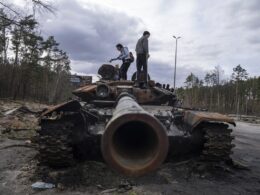Events yesterday in Barcelona gave a powerful indication that the 15-M revolt (in reference to the 15th of May when it began) has much life left in it. The capitalist establishment hoped that following the elections last Sunday, the mass youth movement which castigates all the main parties and their pro-rich policies, would somehow fizzle out. The tremendous response of the movement in Barcelona to the state’s attempt to liquidate the protest seems to have dashed any such hopes for the time being.
It stands as a warning to authorities throughout the state that repression will not be successful in ending this revolt, which represents the beginning of a process of mass struggle, as a generation cast aside by the capitalist crisis raises its head, determined to have its say.
This revolt grew out of the misery of life for millions of young people, with 45% unemployment and millions of others trapped in a cycle of low paid, precarious, hellish jobs. As long as these conditions remain – and in fact the most likely perspective is that they will worsen under the impact of austerity measures – the threat of youth rebellions will be implicit in the situation. If capitalism thinks it can beat or baton charge the problem away, then it is sorely mistaken.
At 6am yesterday, campers on Plaza de Catalunya were woken up to be greeted by a virtual army of hundreds of “Mossos” (Catalan police) surrounding them. The thinking behind the police assault remains unclear. Maybe with Barcelona’s history of marginal violent clashes provoked by police on past demonstrations, it was hoped that a police intervention on the plaza could provoke similar clashes and provide the state with a precendent to move against other occupations throughout the Spanish state. It could also have been planned as a “show of strength” from the new CiU regional and city governments, drunk on success and arrogance after their election victories of the last 6 months and preparing to hammer home a vicious cuts budget amid widespread opposition and protest. But whatever the reasoning behind the decision, a balance sheet of the events reveals that it was a bad one! One look at the crowd which overflowed from the Plaza last night, the largest turnout since the beginning of the movement, could confirm this.
The occupants of the plaza immediately sent out an appeal for supporters to come to their aid. By 10am, thousands of angry and emotional protestors surrounded the police cordon. The crowd included many older workers, including some who had left their jobs to come to the aid of the movement which had inspired them so much. For a number of hours, a stalemate ensued, but it was clear that the police were not going to be able to disperse the plaza. Suddenly, they changed tack. In negotiations with representatives of the occupation, they insisted they were there only to clean the square, and that the occupation could resume after they were finished! While clearly untrue (as they had vividly begun dismantling the occupation’s “infrastructure”, computers, etc), this excuse for intervention was also groundless. The occupants of the plaza, who in matters of “housekeeping” are very well organised, carry out the regular cleaning of the plaza, including its floors, fountains etc. The plaza’s representatives rejected the police request, and demanded to be left to continue the protest.
Then, at a certain stage around midday, the tide changed. The thousands gathered around realised their far larger numbers and in response to appeals from the surrounded campers, began to demand entrance to the plaza. It was at this point that the images of brutal police violence which quickly spread around the country and world, ensued. Protestors displayed admirable constraint. remaining peaceful in their attempts to access the square. Then a surge of bodies broke through a gap in the cordon and thousands streamed into the plaza, with police in steady retreat, some stalling momentarily to deal out further baton blows, as orders came in from high command to withdraw. “The revolution starts here!” began the chants, as the plaza became ours once more.
A demonstration against health cuts in Catalonia later that evening marched towards the plaza, with thousands of young indignados participating alongside health workers and community activists. This represents the type of action necessary to develop the movement further, towards the achievement of its aims. Socialismo Revolucionario (CWI in Spain) participates in the 15-M protests around the country, putting forward proposals to widen the struggle, bringing the power of the organised working class into play by fighting for the calling of a general strike. As the power of the Spanish youth revolt is felt throughout the continent and beyond, with tens of thousands of Greek youths entering town squares in the last days, the task of the building of an international force, which organises around a revolutionary political programme to give a clear expression to the demands of the youth and working class for a decent life, is of acute importance.
More reports and analysis to follow.










